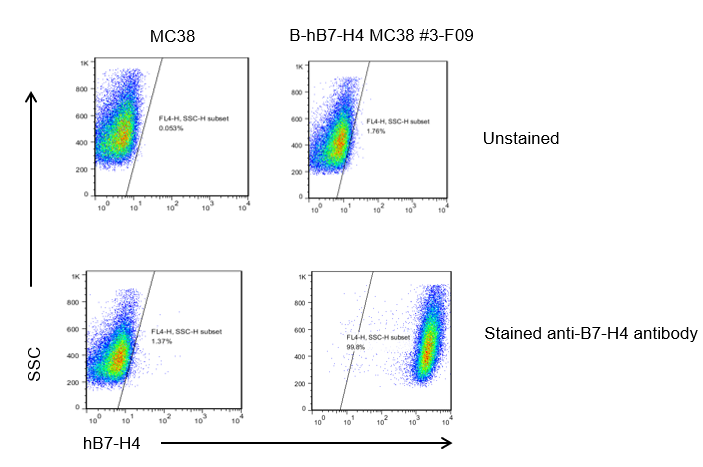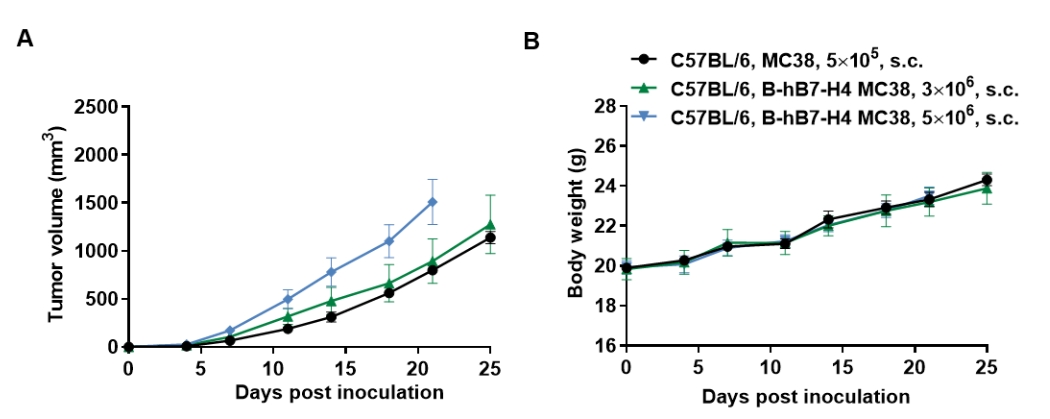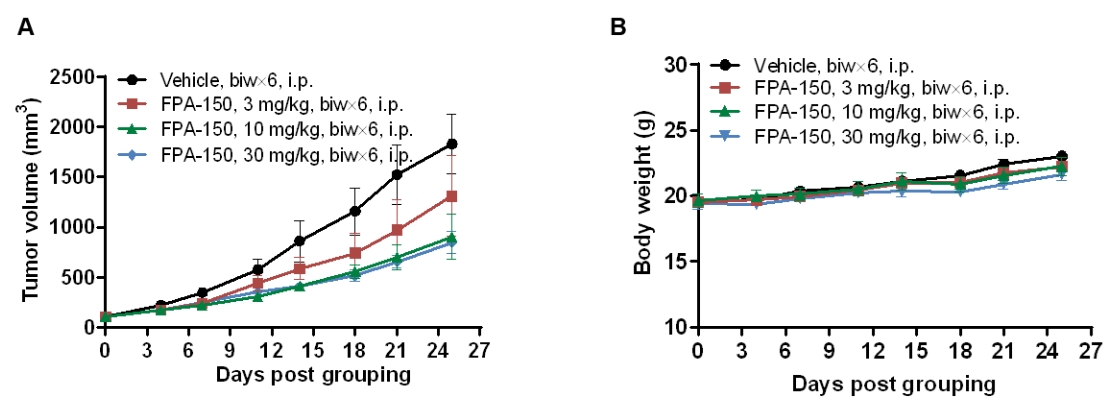Basic Information
Description
The mouse B7h4 gene was replaced by human B7-H4 coding sequence in B-hB7-H4 MC38 cells. Human B7-H4 is highly expressed on the surface of B-hB7-H4 MC38 cells.
-
Targeting strategy

-
Gene targeting strategy for B-hB7-H4 MC38 cells. The exogenous promoter and human B7-H4 coding sequence was inserted to replace part of murine exon 3 and all of exon 4. The insertion disrupts the endogenous murine B7h4 gene, resulting in a non-functional transcript.
-
Protein expression analysis

-

B7-H4 expression analysis in B-hB7-H4 MC38 cells by flow cytometry. Single cell suspensions from wild-type MC38 and B-hB7-H4 MC38 cultures were stained with species-specific anti-B7-H4 antibody. Human B7-H4 was detected on the surface of B-hB7-H4 MC38 cells but not wild-type MC38 cells. The 3-F09 clone of B-hB7-H4 MC38 cells was used for in vivo experiments.
-
Tumor growth curve & Body weight changes

-

Subcutaneous homograft tumor growth of B-hB7-H4 MC38 cells. B-hB7-H4 MC38 cells (3×106 and 5×106) and wild-type MC38 cells (5×105) were subcutaneously implanted into C57BL/6 mice (female, 8-week-old, n=5). Tumor volume and body weight were measured twice a week. (A) Average tumor volume ± SEM. (B) Body weight (Mean± SEM). Volume was expressed in mm3 using the formula: V=0.5 X long diameter X short diameter2. As shown in panel A, B-hB7-H4 MC38 cells were able to establish tumors in vivo and can be used for efficacy studies.

Subcutaneous homograft tumor growth of B-hB7-H4 MC38 cells. B-hB7-H4 MC38 cells (1×106 and 3×106) were subcutaneously implanted into B-hB7-H4 mice (female, 8-week-old, n=5). Tumor volume and body weight were measured twice a week. (A) Average tumor volume ± SEM. (B) Body weight (Mean± SEM). Volume was expressed in mm3 using the formula: V=0.5 X long diameter X short diameter2. As shown in panel A, B-hB7-H4 MC38 cells were able to establish tumors in vivo and can be used for efficacy studies.
Recommendations for inoculation :
- Cell inoculation amount is recommended to be tried between 5×105-1×107;
- Inoculated cells can be tried to be suspended with DMEM stock solution;
- The use of humanized mice for cell inoculated is recommended.
-
Protein expression analysis of tumor cells

-

B-hB7-H4 MC38 cells (1×106 and 3×106) were subcutaneously implanted into B-hB7-H4 mice (n=5), and on 24 days post inoculation, tumor cells were harvested and assessed for human B7-H4 expression by flow cytometry. As shown, human B7-H4 was highly expressed on the surface of tumor cells. Therefore, B-hB7-H4 MC38 cells can be used for in vivo efficacy studies of novel B7-H4 therapeutics.
-
In vivo efficacy of anti-human B7-H4 antibody

-

Antitumor activity of anti-human B7-H4 antibody in B-hB7-H4 mice. (A) FPA-150 (in house) inhibited B-hB7-H4 MC38 tumor growth in B-hB7-H4 mice. B-hB7-H4 MC38 cells (3ⅹ106) were subcutaneously implanted into homozygous B-hB7-H4 mice (female, 8-week-old, n=6). Mice were grouped when tumor volume reached approximately 100 mm3, at which time they were treated with FPA-150 (in house) with doses and schedules in panel A. (B) Body weight changes during treatment. As shown in panel A, anti-human B7-H4 antibody was efficacious in controlling tumor growth in B-hB7-H4 mice, demonstrating that the B-hB7-H4 mice provide a powerful preclinical model for in vivo evaluation of anti-human B7-H4 antibodies. Values are expressed as mean ± SEM.


